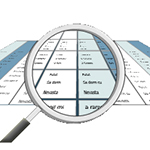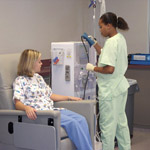Here is a bit of Q&A on the new E/M transitional care codes 99495 and 99496. These codes cover care coordination during the 30 days after discharge from a hospital or skilled nursing facility, and they include communicating with the patient or caregiver, reviewing the medication, and coordinating the care with other providers and with community services. They also require … [Read more...] about E/M transitional care: Q&A on how to code it and get the payments in
Coding Alert
Poisonings, adverse effects, and now underdosing
By Therese M. Jorwic, MPH, RGIA, CCS, CCS-P Poisonings, adverse effects, and underdosing. The poisonings and adverse effects are nothing new. But underdosing is. It’s a new concept that’s found in ICD-10-CM. Here is a comparison of how the new drug reaction codes compare to the old. And the good news is that this area is relatively easy to understand. The same here; … [Read more...] about Poisonings, adverse effects, and now underdosing
Analyzing CPT’s updates from radiology to the end
By Therese M. Jorwic, MPH, RHIA, CCS, CCS-P In the past two issues, we covered CPT’s changes to the E/M codes and the surgery codes. Here now are the rest of the changes. They start with radiology and end with the Category III codes. Radiology There are five newcomers here, all for nuclear medicine. They begin with thyroid studies (78012-78014). The first is for thyroid … [Read more...] about Analyzing CPT’s updates from radiology to the end
CPT’s 2013 updates to the surgery codes
ICD-9-CM and CPT coding update By Therese M. Jorwic, MPH, RHIA, CCS, CCS-P Musculoskeletal system The new surgery codes begin with the musculoskeletal system. New code 22586 is for arthrodesis, or fixation of a joint, in this case the spine. It covers the pre-sacral area, which is the L5 to S1 section of the sacrum right above the tailbone, with the interbody technique. This … [Read more...] about CPT’s 2013 updates to the surgery codes
List I-10’s documentation requirements for the office’s current I-9 codes
Getting ready for ICD-10-CM Here’s another recommendation for the ICD-10-CM move. It comes from Medicare: make a list of the office’s most frequent ICD-9-CM codes and see where the current documentation will need to be expanded for ICD-10. ICD-10 sets out more choices for diagnoses than does ICD-9-CM, so for many conditions, the record will have to show specific … [Read more...] about List I-10’s documentation requirements for the office’s current I-9 codes
ICD-10: getting staff ready won’t be terribly difficult
By Therese M. Jorwic, MPH, RHIA CCS, CCS-P, FAHIMA What in the world does the office do to get ready for it? Here are the parts managers need to know about. New book, same two volumes ICD-10 is the revised version of ICD-9. There are two parts to it, just as there are to ICD-9. The first is the Clinical Modifications or ICD-10-CM (just like ICD-9-CM). Those are the … [Read more...] about ICD-10: getting staff ready won’t be terribly difficult
Coding dementia’s most common form: Alzheimer’s
By Therese M. Jorwic, MPH, RHIA, CCS, CCS-P Alzheimer’s disease is the most common type of dementia. It’s not a normal part of the aging process, but the risk of getting it becomes greater as people get older. In fact, every five years after age 65, the risk doubles. Specifically, it affects about 5.2 million people, and of those, 44% are age 75-84 and 46% are 85 or … [Read more...] about Coding dementia’s most common form: Alzheimer’s
CKD plus hypertension diabetes, and dialysis
By Therese M. Jorwic, MPH, RHIA, CCS, CCS-P March is National Kidney Month, so here’s a look at the coding for chronic kidney disease, or CKD, which affects 26 million adults in the U.S. CKD often goes undiagnosed because its symptoms – energy loss, swollen feet and eyes, frequent urination, and so on – may not appear until it reaches the later stages. The disease gradually … [Read more...] about CKD plus hypertension diabetes, and dialysis
CPT update from path/lab to Categories II and III
By Therese M. Jorwic, MPH, RHIA, CCS, CCS-P The path and lab updates There are more than 100 new codes for molecular pathology, or studies to detect variances in genes. They are divided into two tiers. The Tier 1 codes (81383) are for the tests that are done relatively often such as genetic testing for colon or breast cancer, cystic fibrosis, and Tay-Sachs disease. The Tier … [Read more...] about CPT update from path/lab to Categories II and III








